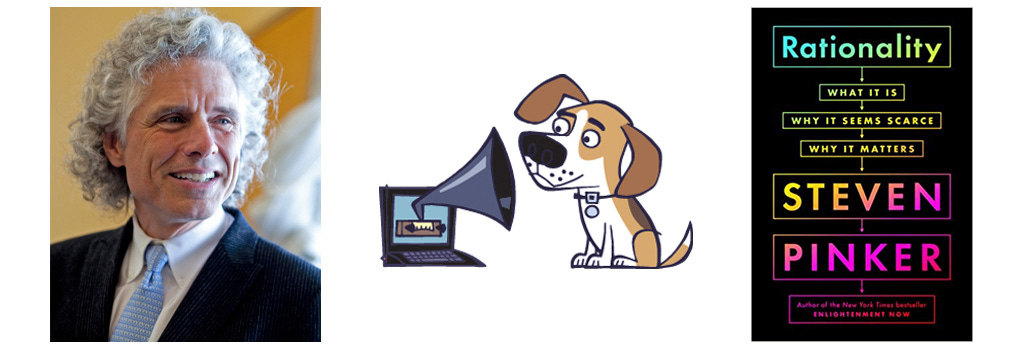Pinker’s new book is Rationality. It’s like taking a Harvard course on the tricks our minds play on us. We had a blast — and I pressed him on several points.
You can listen to the episode right away in the audio player embedded above, or right below it you can click “Listen in podcast app,” which will connect you to the Dishcast feed. For two clips of my conversation with Pinker — on what he believes is the biggest delusion in society today, and what we should do about truths that hurt people — head over to our YouTube page.
If you’d rather watch the whole episode in living color — and see the most famous hair in academia — we videotaped the remote convo in the Dishcast studio. It even has the view from Pinker’s window in the background:
Responding to my latest column on “our gay inheritance,” a reader actually hits on some themes discussed by Pinker and me:
I find your argument regarding the new censoriousness of the LGBTQ community to miss some important context. Namely, the Puritans were once the rebels and the outcasts. I understand that from your perspective, as a gay man, the defining Puritan ethos is one of vicious repression, but I think there are larger truths we can learn once we understand the genesis of the Puritans as a “marginalized community.”
How many powerful groups got their “start” in marginalization? The Catholic Church and Christians in general? Other groups that are so powerful that one might be called a bigot just for stating that they are powerful?
A story of persecution is useful for attracting empathy and support, even after a group has recovered from its marginalization. At that point, is there ever any incentive to abandon the story? No, because as a group rises in status, there is power to be had in advocacy for the group. And the higher the status of the group, the more power can be gained by the advocates. And at some point, the preservation and gain of power becomes the point, and so every marginalized group has a tendency to become “The Puritans” over time.
At this point in history, the larger danger, I believe, is that marginalized groups are being used to advance an agenda — the agenda of low-trust authoritarians. “Believe women” undercuts the presumption of innocence that we used to hold as a sacred belief. “Intent doesn’t matter” goes further along the path, essentially implying that everyone and anyone is guilty, and can be shamed at the pleasure of the attack dogs. “Follow the science” implies that there is only one true correct explanation, as determined by experts deemed in good grace by the media and government. Anyone who disagrees is distributing “misinformation.”
Brilliantly put. This next reader, using the tool of rationality but also empathy, continues a discussion thread from the summer driven by an anti-vax reader:
Immediately before reading the dissents over your “Let It Rip” piece, I read with disgust a wildly judgmental essay that a friend of a friend posted on Facebook. While I agreed with the spirit of frustration with the unvaccinated, the bitterness and judgment of the essay were breathtaking. These essays followed Sam Harris’ mea culpa regarding taking a preachy tone on the topic of vaccination. A pretty easy pattern emerged.
It’s not hard to see that many of us are communicating in tone and tenor that is completely devoid of any understanding for people who are simply afraid of the shots and any potential side effects. And whether these unvaccinated folks are behaving in a way we find rational isn’t really the point, is it? We all know what fear feels like, and no one arrives at a place of fear through a rational exercise — so how can we then judge fearful actions only by the standards of rationality? Yet that seems to be what much of the vaccinated population (of which I am one) wants to do.
Your impassioned final dissenter implied as much, and I sympathize: “What are we up against in the future? No one can say with concrete evidence. You might argue, that’s because there is nothing to worry about. Well, I don’t buy that. I know people in my own circle who have experienced heart issues, long-term fevers, menstrual changes and frequent illness since being vaccinated. That’s within months, imagine years.”
I also know women who suffered strange menstrual changes and people with days of heart palpitations. Those folks’ symptoms did subside, and they know that their cases are rare and that most others’ with the same problems will experience similar relief because they’ve read the opinions of people like Your Local Epidemiologist or watched Scott Gottlieb or plenty of others on the Sunday shows. But many others won’t have found their way to that type of information for whatever reason.
Assuming these experts are correct, should people like the dissenter seek out these data and figure all this out for themselves? Perhaps. But this is a confused media landscape we live in, and as The Dish has well documented, traditional outlets like the New York Times have been caught with their pants down on many occasions — not just with their allegiances to the Woke but with over-exaggerating the nature of COVID, so that the left comes off as psychotic paranoids to much of the right. The mainstream media has earned its reputation as the boy who cried wolf, and while I personally think it’s possible to parse through the hyperbole for the “real” news, I can at least understand the skepticism of those who don’t. While I’ve come to the conclusion that “there is nothing to worry about,” I understand some of the many reasons why others might not.
That said, I hope your dissenter would allow me to take exception with a claim that, while no doubt made in good faith, is simply wrong: “Not one person from the CDC or otherwise has compassionately addressed the very real fears that many of us have surrounding this shot. Not one ‘expert’ has given any feedback or concrete evidence regarding the hesitations that are plaguing the un-vaxxed. At least, no one has done that from a place of respect and understanding that I have been made aware of.”
No vaccine in history — and we have many — has developed long-term consequences. Vaccine side effects have shown themselves within matters of months, not years. I know this — and I suspect you know this — because many experts have addressed several of the primary fears people have about vaccines, including this one for COVID. While it’s true that the CDC has hosted a clinic over the last 18 months on how not to communicate to the public, the information the dissenter wants is now widely available, especially if we broaden our query to experts outside the Center for Disastrous Communication.
To start, if one can get past Sam Harris’ tone and that of his guest, Eric Topol, you’ll hear an obviously bright interviewer talking to a respected physician and researcher discussing the slim odds of short-term side effects, the history of vaccine side effects, the effectiveness of this vaccine compared to others, the misrepresentations of reported side effects, et cetera. Or another friend recently posted a concise University of Alabama-Birmingham press release citing a doctor running a vaccination center, tackling specific concerns over long-term side effects. The list of experts needn’t get longer here, I hope, to persuade your dissenter that experts are speaking out.
Your dissenter hopes to be communicated to from “a place of respect and understanding,” which shouldn’t be too much to ask in stressful times. I empathize. But I hope he or she would similarly consider that many of us find that the evidence is rather settled. Yet within that context of available data, we see people making decisions that put our immunocompromised friends in danger, leave us all exposed to greater chance of variants, and put the small risk of our children getting terribly sick against an even smaller risk of a side effect in getting vaccinated. This is where our sense of urgency comes from.
I think that gets the tone and the facts exactly right. This next reader addresses last week’s episode with John McWhorter on the woke religion:
I think woke culture certainly provides a worldview and a personal sense of a narrative arc. But the central aspect of Christianity — and most religions — is making meaning of our own mortality and easing death anxiety. Think of the famous Bible verse on the promise of everlasting life. For that reason I feel like woke culture is not a religion — there’s no talk of an afterlife.
Indeed. But that makes its religious energy more worrisome. If heaven can be made on earth, and there is nothing else, the justification for radical action in the here and now deepens.
Back to more dissents over my column on “betraying our gay inheritance”:
I agree with your take on where the illiberal left is going, but aren’t these just the children of ACT-UP with similar tactics? Didn’t ACT-UP make a big difference in the end? You seemed to think so when you reviewed the film “How to Survive a Plague.”
Yes, they were. And you’ll notice that my review was not lacking in criticism of some of the tactics. I opposed “outing” quite strongly, for example. I decried the violation of churches. And my measured defense of ACT-UP — largely as a psychological movement for overcoming a sense of helplessness — was in an extremely relevant context. Hundreds of thousands of gay men were dying in a terrifying plague, in a society in which they had almost no rights to family or decency.
I’m sorry but the plight of gay or trans people today is in no way comparable. And the way in which the risks we face are grotesquely exaggerated seems to me to be a rebuke to those of us who tackled a real life-or-death moment, under actual oppression. And dying of AIDS in the early 1990s was a little bit more traumatizing than being misgendered in 2021 in a country where trans people have full civil rights, and where the alleged “epidemic” of anti-trans violence doesn’t actually exist.
But this reader has had enough:
I began reading you when I was in college, in 2001 or so, to counterbalance my own leftward impulses. I’m bi, and having a gay “conservative” as a thought leader felt useful to my brain. Watching you support Obama gave me hope that reasonable conservatives could see that the Republicanism had become deeply violent and dysfunctional.
So I regret so much that I’m unsubscribing to the Dish, because I just can’t stand your constant defense of those who would do violence against trans people. If Trump were re-elected and decided to amp up the cops or round up the gender-nonconforming (like my partner, maybe? Or do they “pass enough”), his Goebbels would quote you left and right to steady their intellectual justifications.
I’m very sorry to lose you. But let me ask: which person “who would do violence against trans people” have I ever, ever defended? You’re not including Dave Chappelle or J.K. Rowling, are you? Because that’s completely insane. Engaging in a debate about some of the thornier questions about trans ideology, especially with respect to kids, is not condoning violence. If it is, then liberal democracy is over. Caving to every mounting demand from every victim faction because of “violence” is crude emotional blackmail that is indistinguishable from irrational hysteria.
And it’s worth recalling that Trump had four years to “round up” the “gender-nonconforming” and somehow didn’t. He failed to make his improvised trans military ban stick. While he was president, the Bostock decision was the greatest breakthrough for trans rights in history.
I support trans freedom and equality strongly. I always have. I do not support critical queer and gender theory — and that position is honestly held by me and by plenty of trans people too. I believe in liberal society. I will never apologize for it.
















Share this post